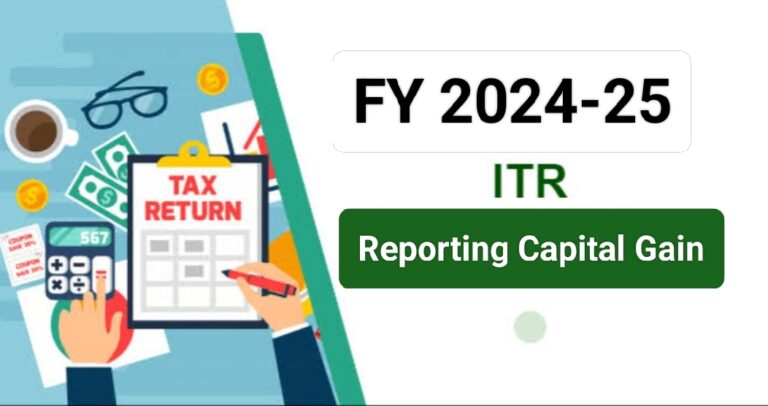As the income tax filing season for FY 2024-25 (AY 2025-26) gains momentum, taxpayers, especially salaried individuals and first-time investors, must tread carefully when it comes to reporting capital gains. A seemingly small mistake—like choosing the wrong ITR form or misreporting gains—can lead to hefty penalties, delayed refunds, or even income tax notices.
Why Capital Gains Require Extra Caution
With growing participation in stocks, mutual funds, and real estate, capital gains have become a crucial part of tax filings. However, many taxpayers overlook the specific rules and forms applicable to them, often inviting trouble.
Capital gains taxation applies to profits earned from the sale of shares, mutual funds, immovable property, and other capital assets. Correct reporting of these gains is not just a compliance requirement but also essential to avoid tax demands, penalties, and legal complications.
Choosing the Correct ITR Form: Avoid Common Errors
Selecting the wrong ITR form is one of the most common—and costly—mistakes made by taxpayers with capital gains. Here’s a simplified breakdown to help you choose wisely:
✅ ITR-1 (Sahaj)
- For salaried individuals with income up to ₹50 lakh
- Allows reporting of up to ₹1 lakh Long-Term Capital Gains (LTCG) from listed shares or equity mutual funds
- Not applicable for individuals with multiple properties, trading income, or significant capital gains
✅ ITR-2
- For individuals with salary, house property income, and all types of capital gains
- Suitable for investors in stocks, mutual funds, and property
- Not valid for those with business income, including F&O and intraday trades
✅ ITR-3
- For individuals with business or professional income
- Mandatory for F&O traders, intraday traders, and business owners with capital gains
✅ ITR-4 (Sugam)
- For salaried individuals with presumptive business income under Section 44AD/44ADA/44AE
- Allows reporting of up to ₹1 lakh LTCG from listed shares or equity mutual funds
- Not suitable for detailed capital gains reporting or complex transactions
Capital Gains Reporting: Accuracy is Non-Negotiable
Once the correct ITR form is selected, the next crucial step is to accurately report capital gains under Schedule CG of the return. Taxpayers must disclose:
✔ Acquisition cost
✔ Sale consideration
✔ Holding period
✔ Applicable exemptions
Any mismatch between reported data and details captured in the Annual Information Statement (AIS) or Form 26AS can lead to income tax notices, reassessment, or penalties.
Exemptions You Should Know to Save Tax
The Income Tax Act offers several exemptions to help taxpayers reduce their capital gains tax liability, provided they comply with the conditions:
- Section 54: Exemption on LTCG from sale of a residential property if reinvested in another residential property within stipulated time limits
- Section 54EC: Exemption of up to ₹50 lakh by investing LTCG in specified bonds (e.g., NHAI, REC) within 6 months of sale
- Section 54F: Exemption on capital gains from sale of any long-term asset (other than a house) if entire sale proceeds are reinvested in a residential house
Special Cases That Need Attention
Certain transactions require additional care during tax filing:
- ESOPs: Taxable as salary when exercised; subsequent sale results in capital gains
- Bonus Shares: Acquired at zero cost, increasing taxable capital gains at the time of sale
- Real Estate: If the property sale price is lower than the stamp duty value, the higher stamp duty value is considered for capital gains, increasing tax liability
Proper Documentation is Your Best Defence
Maintaining accurate records is essential to calculate correct capital gains and defend your claims during scrutiny:
✔ Demat statements
✔ Broker contract notes
✔ Property purchase & sale deeds
✔ Receipts for improvement costs
Tax Department is Watching: AIS Matching is Strict
The Income Tax Department now rigorously matches ITR disclosures with transaction details in AIS and Form 26AS. Discrepancies, even if unintentional, can trigger tax notices or assessments.
Final Tips: File Smart, Not Late
Experts strongly advise taxpayers, especially those with capital gains, to avoid last-minute filing. Correctly choosing the ITR form, accurate reporting of capital gains, and availing eligible exemptions are key to a hassle-free tax season.
Conclusion
Filing your Income Tax Return with capital gains is more than just a compliance task—it’s about safeguarding your financial peace. A small mistake can lead to significant penalties, delays, or legal hassles. Invest the time to get it right and file confidently.
